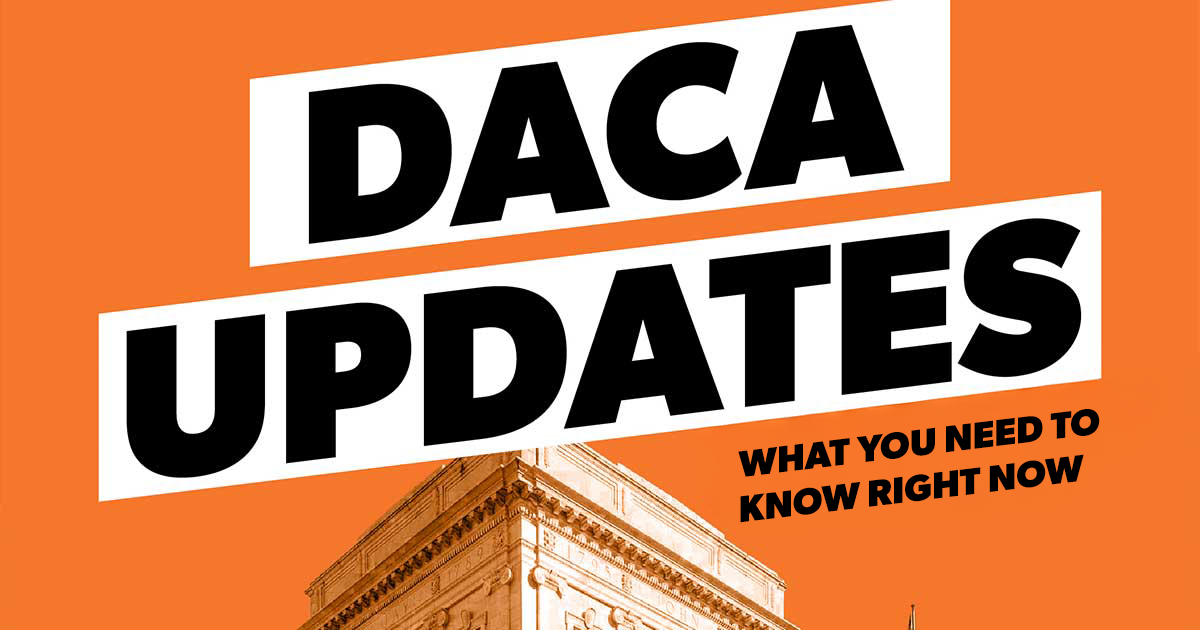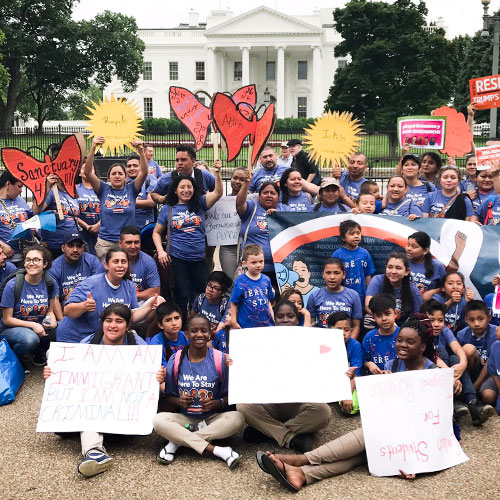With the future of Deferred Action for Childhood Arrivals (DACA) uncertain and an increase in DACA recipients that have been abducted and detained, traveling has become much riskier. While we can’t guarantee that you won’t be detained while traveling, we created this guide to help you prepare if you need to travel with DACA.
Before You Go: Take Preventative Measures:
Carry a copy of your Employment Authorization Document (EAD) and Government Issued ID
- Carry a copy of your UNEXPIRED Employment Authorization Document
- Use a travel ID that is issued by a government agency – not your credit card or school identification card.
- If you are in a state that grants REAL ID to DACA recipients, use this identification for domestic travel (more information about Real ID can be found here).
Tickets for Travel
- Make sure you book your flight or travel so the name on your ticket is an exact match of the ID you will be using.
- Print your ticket, so that you have a paper copy to use with TSA agents.
- If using ground travel, you may be required to present an ID to an agent to board the bus or train. Check identification requirements with the travel company you use.
Make Sure Your Devices are Secure
- Make sure that your phone and computer are password protected. This means a passcode involving a combination of numbers and words, not a fingerprint, pattern or facial recognition method.
- Logout of all emails, social media apps and make sure your two-step authentication is turned on. The best option is to delete social media apps from your phones during travel.
- Optional. Ensure your phone has the ability to factory reset. Create a backup of your phone, then use this function before traveling.
- Install a VPN on your device (laptops, phones, tablets, etc.) to avoid using unsecured systems (ex: publicly accessible wifi networks at airports, hotels, cafes, etc.).
- Additional information and suggestions can be found here.
Share Your Travel Information With People You Trust
- Make sure you have an emergency contact that knows where you are traveling.
- Consider creating a Signal safety group thread that includes your emergency contact(s).
- Immediately text your emergency contact/safety group if you are pulled aside or detained at the airport/train/bus station where you are located and as much description as you can of what is happening.
- If you are traveling with a companion go over your emergency protocols, in the case where you are detained and are unable to text, have your travel companion alert your emergency contact/safety group. If your emergency contact doesn’t hear from you in a sufficient amount of time they should know to contact your wider support network like an attorney, community advocate, and others that can escalate the situation.
Traveling Internationally: Advance Parole
- Advance Parole is permission to re-enter the U.S. granted by USCIS after travel outside the country. It is required for DACA recipients to gain re-entry.
- Advance Parole is not a guarantee for re-entry – in other words, even if you leave the U.S. with Advance Parole, you may be denied re-entry. We strongly recommend you consult with an attorney before traveling internationally.
- If traveling internationally, carry a copy of Form I-797 (DACA Approval Notice), proof of address, and your Advance Parole approval notice in addition to the ID documents stated above (EAD, real ID, passport, i.e.)
- ⚠️ NEW USCIS FEE ALERT – Starting October 16, 2025, USCIS is charging $1,000 immigration parole fee for people granted parole or re-parole, including DACA recipients returning from Advance Parole travel.
Traveling Domestically: TSA Interactions
- It has been reported that TSA “provides a list multiple times a week to Immigration and Customs Enforcement of travelers who will be coming through airports” in order to “send actionable leads to the field regarding aliens with a final order of removal that appear to have an impending flight scheduled.” Some folks, even those who may have some sort of status or protection, may not be aware whether they are subject to a final order. It is recommended that you consult with a trusted immigration lawyer before making travel plans.
- Find more information on this guide by NILC: Community Alert: Immigration Arrests at Airports
- Carry proof of travel documents with you at all times. You can answer general travel questions such as destination and purpose of travel.
- If you are asked about your immigration status you can decline to answer and ask if you are free to go. . If not free to go and detention seems likely, inform them of your DACA or citizenship or assert your right to remain silent and tell them you want to contact your attorney. .
- TSA can search bags and personal items, but you are not required to provide passwords to devices. If asked, decline and request to speak with your lawyer. If an agent takes your personal devices, ask for a receipt from the agent, so you can retrieve the device.
Traveling Domestically: ICE / CBP Involvement
- If asked about immigration status, invoke your Fifth Amendment right to remain silent, and ask for your lawyer. If detention seems imminent, inform them if you are a citizen or have DACA, or are in the US on a visa,
- Provide ID if requested. Do not sign any forms. Do not consent to searches. Especially before you speak to your lawyer
- If traveling on ground transportation be aware of your location, as CBP has the authority to board any bus or train within the 100 Mile Border Zone without a warrant.
- If you are pulled over by ICE, do not provide more information than needed. Ask officers if you are free to go or detained. CBP can visually inspect the outside of your car but cannot search your vehicle without probable cause.
- Traveling in a vehicle with an undocumented person can potentially be dangerous if running into a checkpoint or into law enforcement. Please be advised passengers have the right to remain silent ( see attached for passenger rights and how to respond ) but can still be questioned by law enforcement.
Remember to Stay Calm
- Never claim you are a US citizen if you are not.
- Never provide fake documents.
- Never flee a checkpoint.
- You may ask for agent identification: badge number/name
- Videotaping interaction with ICE/CBP is lawful as long as it is not at a port of entry or on government property and not interfering with legitimate law enforcement operations.
- Under US law, DACA does not equate to a “lawful” immigration status. Precaution & preparation is highly advised, please consider having a preparedness packet with information ready for any potential immigration emergencies.
Additional Sources / Guides
- Immigrants Rising: Guide for Undocumented Individuals Travelling
- ACLU Know Your Rights: 100-Mile Border Zone
- ACLU: Know Your Rights, Enforcement at the Airport
- Wired: How to Protect Yourself from Phone Searches at the US Border
- Supporting DACA Team Members: A Guide for Employers
- Steps to Take if DACA Renewal is Delayed









